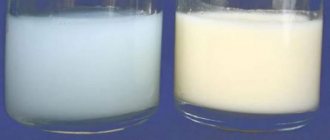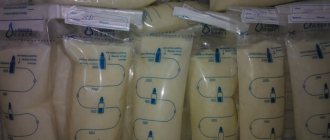After a couple has a baby, parents begin to worry greatly about his health.
A young family is worried about abdominal pain in a newborn, a lack of milk in a nursing mother, and many other problems.
During the first days of life, infants exhibit pathologies associated with the process of digesting food.
This phenomenon is explained by the inferiority of the digestive system, which provokes colic, gas and rumbling in the child’s stomach.
Such disorders bother the baby, so he often cries, refuses to eat and sleeps little. All parents should know why their baby's stomach is rumbling and be able to provide first aid to their baby.
Symptoms of gastrointestinal distress in newborns
A rumbling stomach in a small child may be accompanied by some symptoms. They are:
- Pain in the abdominal area.
- Whims: the baby takes the mother's breast and immediately throws it away.
- Sleep problems.
- Pulling your legs towards your stomach.
- Constant crying.
- Strong gas formation.
- Liquid stool with a greenish tint.
All these signs can be considered normal, because the baby’s food system is just beginning to adapt to new food.
But it is better to keep the process under control and show your child to the pediatrician in a timely manner.
Symptoms
During the period of gas formation and bloating, the disease is accompanied by accompanying symptoms:
- pain in the abdominal area;
- sleep disturbance;
- whims and crying;
- refusal to eat;
- pressing the legs to the stomach;
- loose green stools;
- bloating and gas formation.
The above signs are acceptable in the process of formation of the microflora of a newborn. But to control the situation, you should consult a doctor for examination.
Causes of gas formation in children
When a newborn baby has a rumbling stomach, some parents do not react to it, because they consider the process natural.
But, alas, this is not always the case. There are situations when a baby needs the help of medical professionals.
If a baby regularly experiences rumbling, problems with stool and constant crying, then it is recommended to show him to a pediatrician, because symptoms may indicate the development of dangerous pathological processes.
Most often, a newborn's stomach growls after eating. The rumbling can be heard with the naked ear, and if you touch the belly with your hands, you can feel a real storm.
Experts identify several reasons that can cause rumbling in a child’s stomach. Here are some of them:
- Swallowing excess air during feeding. This is the most common reason. It occurs because the mother does not bring the baby to the breast correctly or because the flow of milk is too strong and the baby does not have time to swallow it.
- Gases in the intestines. Very often the stomach growls after feeding due to the fact that the young mother has eaten something wrong. For example, products that lead to gas formation. Gases can also accumulate due to a lack of fluid in the baby’s body or a lack of lactose.
- Intestinal dysbiosis, which appears as a result of microflora disturbance. The phenomenon is accompanied by a characteristic symptom – foamy and loose stools. In order to alleviate the baby’s suffering, the doctor must take stool for analysis. If dysbiosis is confirmed, the baby will be prescribed medications that will bring his intestinal microflora in order.
- Features of infant intestinal motility. When the baby has eaten, his digestive system begins to take active action, which leads to increased intestinal motor activity. The toddler may feel rumbling. After feeding, the baby should burp out excess air. At this time, the mother should massage the tummy in a clockwise direction.
- Changing your diet. When rumbling appears, you need to think about what the nursing mother ate. An apple or a muffin consumed by its mother can cause unpleasant sensations in a baby. In addition, the infant’s digestion is affected by the medications the woman is being treated with or complementary foods that have recently been introduced into the baby’s diet.
- Intestinal colic. When breastfeeding, a baby can swallow air, which leads to bloating, rumbling in the stomach, pain and suffering for the baby. The onset of colic can be removed by applying a warm heating pad from his own diaper to the baby's tummy.
- Lack of lactose - milk sugar, which is found in any dairy product. In order for lactose to be processed, the work of a number of enzymes is required. Due to the fact that the baby’s digestion is not able to cope with this task, a number of unpleasant problems appear. The condition should go away on its own within a few months. But the risk of severe lactase deficiency cannot be ruled out, which requires diagnostics of the body and adjustments to the baby’s diet.
- "Hungry" rumbling. If your baby's stomach growls all the time, this may indicate insufficient feeding. When a baby wants to eat, juice is produced in its stomach, causing the appearance of rumbling sounds. In order for these phenomena to disappear, the mother must feed the baby with breast milk - the most suitable food for a baby. If the mother does not have enough milk, she will have to select a formula for the babies.
- Overfeeding. If your baby's stomach is grumbling, this may be a symptom of overfeeding. In order not to think about why this happens, you should feed the baby more often, but with less milk.
- An incorrect lifestyle and diet of a nursing woman often leads to pain and rumbling in the stomach of her child. Eating cabbage, hot spices, cow's milk, onions, fresh tomatoes, nuts and caffeine can cause a tiny person's stomach to growl. If these foods are excluded from the diet, the baby’s pain and rumbling will go away in a few days.
- Wrong mixture chosen. It is worth considering that not all infant formulas are suitable for a particular child. It is recommended to buy several different packs of baby food and choose from them the one that is ideal for your little one.
Finding the true cause of rumbling in a baby’s stomach is not so easy. Only attentive parents, through observation, can find out why the baby’s tummy is grumbling all the time.
If you cannot solve the problem yourself, then a visit to the doctor cannot be avoided.
Causes
Rumbling in the abdomen in a newborn can be a consequence of several factors:
- The baby is hungry. The body's need for nutrition provokes the stomach to secrete juice. The digestive tract produces characteristic sounds, signaling that all systems are ready to digest food. In this case, it is necessary to feed the child. The best food for a newborn is mother's breast milk. If there is a need for artificial feeding, then you should choose the most suitable nutritional formula for the child. Along with purring, a baby may cry a lot when hungry;
- Colic. In children from birth to two months, the physiology of the body provokes an increased formation of gases, which cause colic in the abdomen. Some babies suffer from the disease for up to 6 months. Immediately after birth, the intestines are in a sterile state. There can only be meconium inside - original feces. After the first intake of the dairy product, the intestinal microflora begins to improve. As a result of the lack of beneficial bacteria, increased fermentation is observed, which provokes bloating. In this situation, treatment is not carried out. It takes time for the intestines to organize the microflora;
- Lactase deficiency. From the first days of life, the child begins to eat dairy products that contain lactose. To digest it, a special enzyme is required - lactase. If it is absent or the body produces it in insufficient quantities, then the newborn’s stomach rumbles. To clarify the diagnosis, it is necessary to submit feces and urine for analysis. If the pathology is confirmed, then it is necessary to replace the diet with an adapted mixture. Baby food manufacturers have created a special composition for such children;
- Dysbacteriosis. As a result of disruption of the intestinal microflora, dysbacteriosis develops. In this case, the newborn has a rumbling stomach and diarrhea. The rapid development of dysbiosis occurs due to an increase in pathogenic microorganisms. You need to see a doctor to prescribe medications. Such drugs as Linex, Lactobacterin, Enterol are widely used;
- Lack of enzymes. If your baby suddenly starts rumbling, this may be due to a lack of enzymes in the body. This phenomenon occurs when newborns are given complementary foods to their main diet. Various enzymes are required for normal digestion to function. If something is missing, the food enters the intestines in its original form (not digested). As a result, the process of fermentation and increased formation of gases starts. In pharmaceuticals, there are a number of drugs that replenish the missing substance. Only a specialist can determine which one and prescribe the appropriate remedy.
How to help your child at home
In this situation, it is very important to understand why the baby’s stomach growls after feeding, and try to help him get rid of the unpleasant sensations.
There are several methods that can help eliminate colic in a newborn. They are:
- Using a heat compress. You need to heat a soft cloth with an iron, place it on your tummy and press the baby’s legs to your chest. After completing this procedure, the child will calm down and fall asleep.
- Turning the child onto his tummy, performing special gymnastics.
- It is recommended that the mother carry the newborn more often after breastfeeding. In the room, you need to dim the lights and turn on quiet, soothing music, which has a positive effect on the toddler’s nervous system. In the evenings, it is worth massaging the baby’s back and tummy, working with your hands slowly and carefully. You need to massage the umbilical area especially carefully.
- Rhythmic flexion and extension of the legs, which help the passage of food into the intestines.
Dill water or chamomile decoction should be on hand at all times. You can use a gas outlet tube, but only in rare cases.
Measures to help get rid of this unpleasant phenomenon
Experts do not recommend leaving things to chance if your child’s stomach is rumbling. In no case should you wait for days for your local doctor to come and tell you how to eliminate the seething. The parent is obliged to immediately provide appropriate assistance to his child. There are a number of measures that will help eliminate the seething process in the baby’s intestines. Any, even a completely inexperienced young mother can do them.
First of all, you need to try using a gas outlet tube. When buying it at a pharmacy, you are provided with detailed instructions for its use. The young parent is obliged to give the baby a massage that would help get rid of the rumbling. In this case, the child must lie on his tummy, otherwise there will be no effect.
You can also massage your baby's tummy in a clockwise direction. If the baby is very restless, you can use mint drops, which significantly reduce pain. Pediatricians often advise doing a set of certain exercises. To do this, the baby should be placed on his back, and in this position, raise the child’s legs, slightly bending at the knees. Sometimes such physical exercises help remove excess gases that have accumulated in the intestines from the small body.
If the mother notices that the newborn’s tummy is often seething, then it is imperative to contact a professional who will examine both the child and the mother.
Very often the problem occurs due to improper feeding. The baby must tightly grasp the mother's nipple so that excess air does not enter the intestines. After finishing feeding, be sure to hold the baby so that he burps the remaining air that has entered his intestines.
In case of severe colic, the doctor will prescribe a special laxative that will allow the child to get rid of discomfort and excessive seething. Very often, lactation is the main cause of rumbling in the tummy. That is why experts recommend regularly expressing milk to mothers whose children do not always latch on to the breast.
And, of course, the child’s tummy should always be warm, so pediatricians advise wrapping the child if the room temperature is less than 23°C.
How to prevent bloating
In order not to wonder why a child’s stomach rumbles during feeding, you should know the measures to prevent pathology. They are:
- A nursing mother should ensure that the baby latches onto the nipple correctly.
- To feed your baby with formula, you should buy a special anti-colic bottle.
- When the baby has eaten, you need to hold him in an upright position for a while. This solution will help the child burp excess air.
- In the summer heat, it is recommended to give your child boiled water.
- If the child’s stomach often rumbles, then the mother should always have medications in her medicine cabinet that reduce gas formation and help remove them from the body.
If all the specified rules of behavior with an infant are observed, parents do not have to worry about pain and colic in his stomach.
But you need to remember that the child should be regularly examined by a qualified pediatrician.
If your baby has any pathologies of the gastrointestinal tract, you need to promptly examine his body and follow the doctor’s recommendations regarding the prescribed treatment.
You should not turn a blind eye to the problem, because it can become chronic and bring a lot of suffering to the child in the future.
Signs
It’s not difficult to hear your newborn’s stomach growling. It is enough to put your ear to his tummy. Sometimes it boils quite strongly, and such a symptom may be accompanied by additional sensations:
o pain, especially if you press on the tummy;
o whims during feeding;
o poor sleep;
o the child kicks his legs;
o flatulence;
o bowel dysfunction (sometimes liquid stool with greenish specks).
In this case, a doctor's consultation is necessary. Based on these symptoms, he will identify the cause of concern and prescribe treatment or prevention measures.

Useful video
The long 9 months of waiting are over and the painful process of giving birth to a baby has been completed. It would seem to grow and rejoice. But no! The child is worried, screams, pulls his legs up to his tummy, and you can hear that the baby’s belly is rumbling. It is clear that the little one does not sleep, sometimes does not eat and does not give life to everyone around him. Newly-made parents begin to get nervous and come up with all sorts of horrors, which worsens both their own condition and the baby’s peace of mind! What to do if your baby has a storm in his stomach? What to pay attention to and how to help your beloved child?
Grumbling belly - signs and symptoms
Rumbling in a baby's stomach often occurs after eating.
Only an inattentive or irresponsible parent will not notice this problem in a baby. As a rule, symptoms begin to develop after feeding and are audible to the naked ear. And if you put your hand to your belly, you can clearly feel that there is a real storm going on there. The following symptoms may be added to a rumbling tummy:
- Discomfort, abdominal pain
- Whims when feeding the baby - may take the breast, then immediately give up
- Sleep disturbance
- The baby presses his legs to his tummy
- Unmotivated cry
- Increased gas formation
- Liquid stool, sometimes with greenish impurities.
If such unpleasant symptoms are added to the rumbling in the stomach, then you need to contact your pediatrician, find out the cause and, possibly, undergo treatment.
Why does a newborn's stomach gurgle: the root cause
During the first four or five months, the baby’s body adapts to extrauterine life and improves in its new environment. The most significant changes occur in the digestive system. The microflora that populates the baby's intestines is often accompanied by gas formation. The baby is straining and crying a lot. It is difficult to calm him down; the baby's stomach is seething. This is “colic”.
Important!
Colic is increased gas formation in the abdomen.
Although colic occurs in newborns of both sexes. It is generally accepted that in the stronger sex they last longer and are more difficult to tolerate. Statistics do not divide sufferers by gender and indicate that there are as many as 70% of them. And the lucky ones who are not bothered by abdominal pain are an absolute minority.
Rumbling in the stomach. Possible reasons
Doctors identify several causes of stomach grumbling in babies:
- Features of peristalsis in the intestines
- Changing your baby's diet
- Colic
- Lactose intolerance
- Microflora
Attention! Only a doctor, after examining the baby, can determine the cause of the unpleasant symptoms.
Peristalsis in a baby and first aid in this case
After feeding, the baby's digestive system begins to actively work. As a result, intestinal motility increases. This can cause a rumbling stomach and discomfort for your toddler. After feeding, you need to let the baby burp out excess air. Iron the diaper folded in several layers and place it on the baby's tummy. You can massage your tummy with stroking movements in a clockwise direction.
Changing your baby's diet - how to deal with rumbling
Changing your baby's diet can help with a rumbling stomach.
Analyze what the mother ate before feeding. Perhaps some apple or bun, having passed through the mother’s stomach and into the milk, is the culprit for the baby’s rumbling stomach. The same unpleasant reaction can be caused by medications that a woman takes. Therefore, you need to carefully read the instructions to see if this product is approved for a nursing mother.
If the baby is already being introduced to complementary foods, then this may be a reaction to a new product. Therefore, it is advisable to offer a new type of complementary food - juice, puree or porridge - to the baby in the first half of the day. This way you can observe the baby’s reaction to new food. It is better to endure rumbling, diarrhea and other unpleasant reactions during the day than to deal with them at night.
Colic - how to help your baby
During feeding, the toddler swallows some air. This causes bloating and rumbling in the stomach, pain, crying and suffering. This is the most common cause of baby suffering. After feeding, you need to hold the baby in an upright position and let him burp. This will reduce the amount of air in the baby's stomach. If colic begins, you can make a warm heating pad from a diaper. In this case, abdominal massage, lying on the stomach, and motor exercises—biking—help well.
Lactase deficiency - scary or not so bad
Lactose is milk sugar that is found in all dairy products. A number of digestive enzymes are needed to process it. The baby’s digestive system is still imperfect and takes several months to develop. Therefore, he may lack the necessary enzymes. Usually this condition goes away on its own within 3-4 months and the belly stops rumbling. In rare cases, severe lactase deficiency develops. This is a disorder of the digestive system, which is confirmed after examination by a doctor. In this case, adjustments to the baby’s nutrition will be required.
Causes of stomach turmoil in a newborn
Only with the transition to a new type of feeding does the newborn’s intestines begin to form the microflora necessary for processing food, and the walls of the stomach gradually become stronger. This imperfection of the digestive system is the most common, however, not the only reason why a baby’s stomach is seething.
Rumbling causes discomfort and is accompanied by additional symptoms:
- increased irritability and frequent crying;
- sleep disturbance;
- loss of appetite;
- crying when feeding;
- the child presses his legs to his stomach;
- flatulence;
- bowel dysfunction (diarrhea or constipation);
- temperature increase.
To prevent constant churning in the baby’s stomach, parents should:
- do tummy massage and gymnastics every day - these methods not only improve digestion, but also strengthen the muscular system;
- monitor the mother’s diet if the baby is breastfed - the child’s body is sensitive to harmful foods, even half a hamburger or 100 ml of cola can cause significant harm;
- You need to feed your baby when he wants to eat, and not as written in the daily routine. Pediatricians do not recommend adhering to the rule of feeding by the hour.
During feeding, you need to ensure that the baby does not swallow too much air.
Rumbling in the stomach of a newborn baby is an inevitable process that occurs in most children. It can be caused by both harmless factors and some violations committed by parents. But getting rid of it is quite simple if you follow the doctor’s recommendations.
The easiest way to help a child normalize the functioning of the stomach and intestines is to review the mother’s diet, if, of course, the baby is on breast milk. Eliminate legumes, fermented milk products, and pears from your diet and see if your baby feels better. This will be noticeable not only by the sounds coming from your baby’s little “belly,” but also by the color and consistency of his “stool.”
Often babies greedily attack their mother's breast or bottle and, as a result, do not latch onto the nipple or pacifier correctly. If the bottle or mother's breast is grasped incorrectly during sucking, air enters the baby's stomach, so it is important to ensure that the baby grasps not only the tip of the breast or bottle nipple, but a much larger space.
At the first stage, you should figure out why the baby’s stomach is bubbling? Parents must understand that the human digestive system works around the clock. Its functioning is also characterized by systematicity. Juices that are part of the mucous membrane are constantly secreted in the stomach and intestines. The process is carried out even if there is no food in the system. The muscle fiber still continues to contract rhythmically.
If a baby's stomach is seething, then perhaps air has simply entered the intestines and is trying to escape. Gastric juice mixes with gases. Against this background, parents may hear unusual sounds from the baby.
In an adult, there may be no rumbling in the stomach at all. When food enters his stomach, it spreads along the walls. This is why the organ cannot reproduce unusual sounds that may occur in a child.
If some strange sounds regularly occur in your newborn’s stomach, you should immediately contact your doctor. He will conduct a diagnosis and rule out the presence of pathology. In case of illness, early diagnosis is useful. This will help avoid serious consequences in the future.
Abdominal colic in a baby causes him and his parents a lot of discomfort. Against this background, the child begins to writhe, strain and twist. The manifestation is aggravated by crying and grunting. Parents should ask their pediatrician what to do in this situation. It is important to stop the pain of a newborn in time. Otherwise, the risk of worsening the situation increases.
Additionally, it should be noted that colic quite often occurs in a child at night. Against this background, the whole family may not get enough sleep, because the baby becomes overly whiny and irritable. At this moment, the newborn’s tummy is also seething, because the gases cannot get out.
Quite often, a child's tummy rumbles due to excessive gas formation.
It is important to understand not only why a baby’s stomach growls during and after feeding, but also how to help him cope with this problem. A heat compress can be used to relieve and eliminate colic. To do this, soft fabric is heated with an iron, applied to the tummy, and then the baby’s legs are pressed to the chest. The procedure helps the child calm down and fall asleep.
The child should often be placed on his tummy, special gymnastics should be done with him, and he should walk around the room with the baby in his arms, where there should be dim lighting and soothing music, which has a good effect on the nervous system. In the evening, you can give your baby a small massage on the back or tummy with light massaging movements in a clockwise direction, without pressing too hard. Movements in the navel area should be especially careful.
It is also recommended to rhythmically bend and straighten the legs, as this helps food pass into the small intestine much faster. If all these remedies do not help, then you can prepare dill water or chamomile infusion for your child. In exceptional cases, use a gas outlet tube.
Review of popular drugs for a rumbling belly
Espumisan L is a drug for colic in children.
Sometimes home methods of dealing with unpleasant sounds and pain in the baby’s stomach do not help. The child is suffering, the parents are suffering. In this case, it is advisable to use special medications to improve digestion and eliminate colic. What is prescribed for colic in toddlers:
- Dill water
- Plantex
- Espumisan L
- Bobotik
The choice of remedy is the prerogative of the pediatrician. Self-medication in this case is inappropriate!
Dill water
This is a remedy that has been tested on thousands of generations of inhabitants of planet Earth. In the USSR, there was no other drug for children that relieved colic and rumbling. And nowadays, a decoction of dill seeds has not lost its relevance. It is best to purchase the drug at a pharmacy. Usually dill water is prepared directly in pharmacies, but you can also buy ready-made forms. Professional pharmacists are equipped with precise scales and other equipment.
Therefore, all the subtleties of preparing the decoction and aseptic conditions will be observed. The dosage is selected individually - from 3 to 6 teaspoons per day. A contraindication to the use of dill water is individual intolerance to fennel seed oil. Therefore, monitor the baby’s condition!
Side effects are cutaneous in nature - itching, urticaria, tissue hyperemia.
Plantex for colic
Plantex for colic - a remedy for colic.
The medicinal enzymatic preparation "Plantex" is essentially the same dill water, only in the form of granules and a well-promoted trade name. The main active ingredient is fennel oil. The drug is available in sachets.
The contents of the package are dissolved in water and used for their intended purpose. Children under one year of age are prescribed 1–2 sachets per day in several doses. Children from 1 year to 4 years – from 2 to 3 packets a day. Contraindications to taking the drug:
- Galactose or glucose malabsorption syndrome
- Lactase deficiency
- Galactosemia – metabolic disorder
- Individual intolerance to fennel oil
For babies, only a fresh solution is used without adding sugar or other sweeteners.
Espumisan L for colic
As the advertising slogan says, “if there is a hurricane in your stomach, take Espumisan.” This carminative is available in the form of a milky white emulsion. The main active ingredient simethicone reduces the density of gas membranes. Thanks to this, small bubbles collect into larger ones and are easily removed from the body. Babies under one year of age are prescribed 25 drops 3 times a day with meals. Children from 1 year to 6 years – 25 drops 3 to 5 times a day. No side effects were observed with Espumisan L. But there are a number of contraindications for use. Do not use a carminative for:
- Intestinal obstruction or suspicion of it
- Individual intolerance to the drug
Emulsion "Espumizan L" does not contain sugar or artificial sweeteners, so it can be used in patients with diabetes.
Bobotik for colic
Bobotik is an excellent remedy for colic in children.
This drug is essentially the same “Espumizan” only under a different brand name. The main substance - simethicone - is the same as in Espumisan. But the appearance is a cream-colored emulsion with a pleasant smell. The drug is approved for use from the 28th day of a toddler’s life. Dosage for children from 28 days to 2 years – 8 drops 4 times a day. Children over 2 years old – 14 drops of the drug 4 times a day. Contraindications to the use of Bobotik:
- Age up to 28 days
- Intestinal obstruction
- Individual sensitivity to the component
- Various diseases of the gastrointestinal tract
In any case, the drug should be selected by the attending physician in conjunction with the parents of a particular toddler.
Preparations for normalizing intestinal microflora
Currently, TV screens encourage people to take medications to normalize the body's microflora. There are several dozen different names of such medicines. Doctors like to prescribe them, even when it is not required. As a matter of principle, it won’t hurt! The opinions of pediatricians were divided. Some prescribe medications like Linex and others for toddlers with colic, others are strongly against it.
This category of doctors believes that each person’s microflora is individual, and it is almost impossible to populate it with beneficial bacteria from the outside. In addition, the baby should develop its own unique set of useful and not so useful microorganisms. Therefore, do not rush to give your little one drugs with bifidobacteria and lactobacilli. Indications for taking such drugs can only be the results of an analysis for dysbiosis or bacterial content of the intestinal contents. So, dear adults, experiment on yourself! And it’s better to entrust the baby’s health to an experienced pediatrician!
Thematic video material will tell you about colic in newborns:








